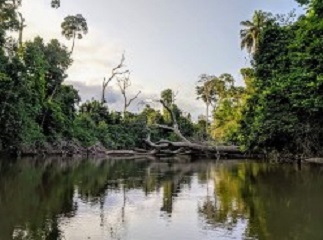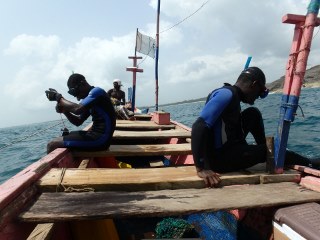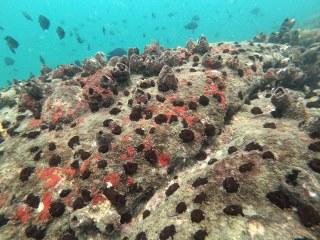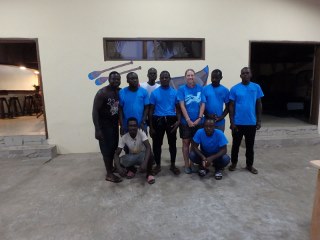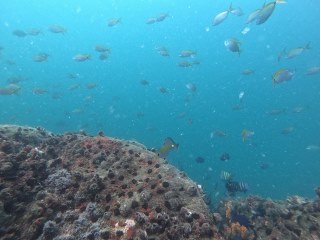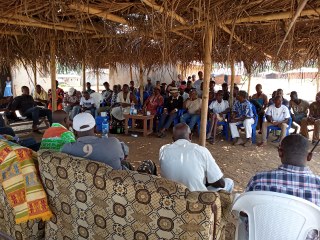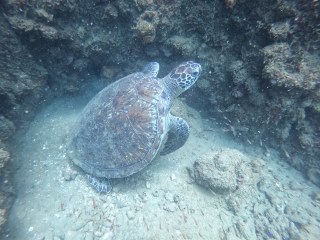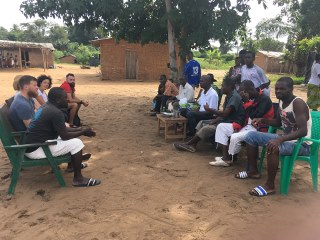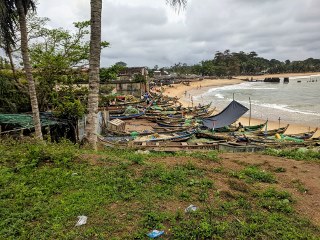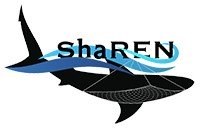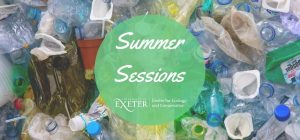
Welcome to Week 2 of the Centre for Ecology and Conservation’s Summer Sessions. This week’s theme is Plastic Pollution, in support of the Plastic Free July movement. Marine plastic pollution is particularly close to our hearts as we’re lucky enough to be surrounded by the ocean in Cornwall, and many of us have made it our lives work to study the sea. The CEC is doing so much research and teaching around plastics that it’s been hard to decide what to share! This is a very sad topic, and some of our research has shown just how bad the problem is, but we’ve also been working hard to help reverse the damage and change behaviours. So read on to learn more about the problem and what can be done.

Plastic Pollution Webinar and Live Q&A
Watch Professor Brendan Godley and team give a webinar and Q&A all about the plastic pollution research from our students and research staff!
Summer Sessions – Plastic Pollution
Welcome to our Summer Session on Plastic Pollution! Hear from Professor Brendan Godley about the impacts that plastic pollution has on the marine environment. You will also be introduced to a team of our former students who will be LIVE after this video to answer your questions! If you have anything you would like to ask, comment below! Please share widely!
Posted by University of Exeter Centre for Ecology & Conservation on Friday, 10 July 2020
https://www.facebook.com/UniExeCEC/videos/608957493159252/
Plastic Ingestion in Sea Turtles
It’s really important to us in the CEC that our research is heard by everyone, not just scientific experts. Dr Emily Duncan has made a video abstract of her recent paper on sea turtle ingestion of plastics, which you may have seen featured on numerous TV interviews. Video abstract is available here. Emily was recently chosen for the Forbes 30 Under 30 in Science and Healthcare, an incredible achievement. You can read more about Emily’s research and see the full list here.
https://www.facebook.com/UniExeCEC/videos/3716611148354254/
Shark Entanglement
With so much plastic floating around, it’s no surprise that it finds its way into the food webs of marine ecosystems. Our newsfeeds are battered by reports of stranded marine animals whose stomachs are littered with plastics. However, we rarely hear about sharks. MRes and former undergraduate student Kristian Parton tells us how hundreds of sharks and rays have become tangled in plastic waste in the world’s oceans in a video here.

Queen’s Anniversary Prize
Billy Heaney (former CEC undergraduate and now Masters By Research student) recently made a film about the Queens Anniversary Prize awarded to the University for plastic research. Along with colleagues from PML, Exeter researchers were commended for their work on the effects of marine plastic pollution, especially the effects of micro and nano-plastics – tiny plastic particles less than 1mm in length. The team’s research has visibly impacted governmental decision making, for example contributing to the 2018 UK ban on microbeads in cosmetics. Research by the team has also shed light on the presence of plastic in the food chain, finding trace levels of bisphenol A (BPA), a chemical used in the production of plastic, in 86% of Devon teenagers.
Queens Anniversary Prize for Higher Education
Please share widely! Today, on #WorldOceansDay, we celebrate the recent receipt of the Queen's Anniversary Prize For Higher Education (2019) for our research on the impacts of plastic pollution on the marine environment. This highly collaborative work has spanned the campuses and has been facilitated by a large number of partners, particularly Greenpeace UK Research Laboratories and Plymouth Marine Laboratory. Funding has been diverse, but key has been the Natural Environment Research Council, which has sponsored many of the PhD students who are featured in the film. The film was made by ExeterMarine graduate, Billy Heaney and Muddy Duck Productions.
Posted by ExeterMarine on Monday, 8 June 2020
Beach Guardian
Beach Guardian was co-founded by CEC’s MSc Student Emily Stevenson. Her Community Interest company organises community beach cleans and conducts educational workshops with schools and other groups to connect people with the environment to improve the health and wellbeing of both people and planet. Their Facebook page runs a weekly vlog, Tune in Tuesday, which has just turned 100! Emily recently won ‘The Diana Award’. Established in memory of Diana, Princess of Wales, The Diana Award is the highest accolade a young person can achieve for social action or humanitarian efforts.

Plastic Wave Documentary
A Plastic Wave is a powerful documentary by James Roberts, a surf photographer, business owner and father of two who is seeing more and more plastic wash ashore his beloved home beach. In a bid to discover the route of this problem he embarks on a journey of discovery, and along the way he talks to the CEC’s Dr Sarah Nelms (who did her MSc, PhD, and is now a post-doc with us) about poo and guts.

Scientists at Sea Podcast
ExeterMarine’s Scientists at Sea podcast features some of our department’s world-leading science in marine ecology and conservation. Here is one our favourites:
-
- CEC MRes students Flora Rendell, Lowenna Jones, and Daniel Osmond joined the Sail Against Plastic team aboard the Blue Clipper to investigate the impact of plastics and noise pollution on the arctic seas around Svalbard. The team produced film, photography and artwork to capture the experience and illustrate their findings. ExeterMarine’s Scientists and Sea podcast interviewed our students before and after their expedition. Listen here, you can also watch the expedition here.
Science in Society Projects

- Science in Society is a level 3 undergraduate module in which students study the two-way interaction between society and science, i.e. what society wants from scientists, and how scientists can engage different parts of society in research. We also study why there is sometimes a divide between scientists and society. As a final assignment, students produce an outreach project that engages the public in cutting-edge scientific research. Some of these projects are so good that we wanted to share them here. Of course we can only host the projects that are web-friendly here. There are countless other amazing and creative projects we can’t feature!
- The Sandy Scientist, by Neve McCracken-Heywood, is a magazine to involve 14-18 year-olds in science projects that collect data on ocean plastic. Studies show that many fail to pursue science after school as they feel it is not relevant in their everyday lives and so this magazine showcases how science is conducted beyond the classroom and influences every day life. The magazine, which can be read here, also emphasises the power of individuals to create change.
- Eco-enlightenment, by Freya Bolton. This blog is for those who suffer from eco-anxiety, feeling anxious about the environment and climate change. Given the mainstream media’s predominantly negative coverage of the environment, the blog and Instagram account are a sanctuary for those who want to read about overlooked positive environmental news. You can read about biodegradable plastic, turtles and edible packaging, and the ocean cleanup. Instagram: https://www.instagram.com/ecoenlightenment
Cote d’Ivoire Marine Protected Areas

Dr Kristian Metcalfe is working with government and local NGOs in Cote d’Ivoire to implement the country’s first marine protected area. To ensure the conservation is successful, he and his team have been learning about local people’s perceptions of the natural environment to increase understanding of the benefits from marine biodiversity. The team has developed educational posters like the above to highlight the benefits of marine protection on biodiversity. There are extremely low levels of literacy in the area, so many of the materials they are developing are visual, like this.
The Tale of the Turtle and the Plastic Jellyfish
Nerin is a sea turtle who loves eating jellyfish. One day, she accidentally eats a plastic bag which puts her in a spot of bother. Luckily, Professor Penny, along with her canine friend, Wilson, is on hand to save the day! Professor Penny Stories are a series of children’s books written by staff and students of the University of Exeter’s College of Life and Environmental Sciences based in Penryn, Cornwall. Each with a unique style and appropriate for a range of ages, these stories bring scientific research and natural history to life—from microbiology to animal behaviour and conservation. Read The Tale of the Turtle and the Plastic Jellyfish here (in 8 languages).

Sea Turtles and the Perils of Plastic
The impact of plastic pollution on sea turtles is particularly worrying. Turtles are highly mobile, travelling huge distances between foraging and breeding areas, and they use both terrestrial and oceanic environments. Already under increasing pressure from a range of human stressors, including climate change, by-catch and habitat destruction, these charismatic animals are undergoing a three-pronged attack from plastic in the form of ingestion, entanglement and habitat degradation. The CEC’s Dr Sarah Nelms discusses Sea turtles and the perils of plastic.

Shark and Ray Entanglement Network
As well as the video and podcast above, MRes and former undergraduate student Kristian Parton, has a blog post all about how plastic affects sharks and rays, which you can read here. You can also read an interview about the Shark and Ray Entanglement Network he set up.


